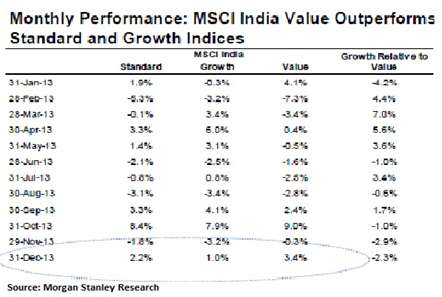For a Contrarian Bet
We start the first recommendation for this calendar with an offbeat choice – Tata Dividend Yield. Most of you would have been put off by the performance of dividend yield funds in the last year and may therefore be surprised by the choice of the currently underperforming theme.
But then, perhaps that itself is an indication that the theme is a contrarian buy. If you believe that we are in for some more quarters of volatile performance and you could expect some revival by the end of this year, then dividend yield funds would be a good choice to ride the first wave of recovery.
Tata Dividend Yield’s return of 22 per cent compounded annually in the last 5 years places it among the better funds in this category. A portfolio of ‘value’ picks, a good number of them being mid caps, provides high scope for upside potential when a revival does happen.
Suitability
Tata Dividend Yield is suitable only for investors who are willing to take a contrarian call and have some risk appetite. Dividend yield funds can normally be expected to contain downside risks better, given that their holdings are most often value picks.
But this time around, higher weight to the currently beaten down banking space, which continues to remain out of favour, makes this fund and the theme choice a bit risky. Investors with limited risk appetite should stick to large-cap funds instead of this theme.
The fund will also require a holding period of not less than 3 years, as dividend yield stocks, that often turn out to be value picks, may take time to deliver.
Performance
Tata Dividend Yield has emerged as an outperformer, compared with peers such as UTI Dividend Yield as well as Birla Sun Life Dividend Yield Plus, in recent years. Sizeable exposure to mid-cap stocks compared with peers, besides focused sector bets, have worked well for the fund.

Over the last five years, the fund has delivered superior risk-adjusted returns when compared with peers. When returns are set to roll every day, rolling one-year returns of the fund over the past 5 years beat the benchmark index CNX 500 78% of the times. That is a good record against a broad market index such as S&P 500.
While the fund’s return was prone to swinging quite a bit in earlier years, in the past 3 years, the fund’s standard deviation was far lower than peers, suggesting that it may be a better fund (among peers) to generate steady returns with limited volatility.
Portfolio
Tata Dividend Yield seeks to hold at least 70% of its portfolio in stocks which have a higher dividend yield than the Sensex. As of November (the last available fact sheet) , the fund’s portfolio had an average dividend yield of 2.4% as against 1.4% for the Sensex.

With a 15% exposure to banks and a 11% holding in financial services, Tata Dividend Yield has as much or slightly more holding in these sectors when compared with the benchmark. Max India, an insurance and healthcare player, is an offbeat pick in its fold.
Other value picks in the banking and finance space include Karur Vysya Bank and Jammu and Kashmir Bank. Falling prices have drastically increased the dividend yield on banking and financial stocks, thus tempting the fund to stock up on this sector. Banking stocks accounted for only about 9% of the portfolio a year ago.
Stocks in the industrial products space, such as Cummins India and Bharat Forge, as well as mineral stocks such as GMDC and Coal India are all stock choices with beaten down valuations, that can be expected to deliver on a recovery. Quality media stocks such as Jagran Prakasan are also picks that trade lower compared with a year ago.
That said, value stocks have seen some momentum in recent months and that is captured in the MSCI India Value index. The table below shows that the MSCI value index has outperformed the growth index in the last 3 months, suggesting activity in beaten down stocks of quality companies.

The fund is managed by Rupesh Patel from June 2013. The fund will complete a decade, end 2014. Since inception in November 2004, the fund delivered a return of 16% compounded annually.









GLAD TO KNOW THAT THERE IS ANOTHER FUND IN THE STABLE OF TATA SUITABLE FOR INVESTING.A WELCOME COMMENT.
Dear Vidya,
I hope dividend yeild funds might not be a good choice for people who fall in 30% Tax Bracket. What you say?.
While they can avail tax free returns on the Equity Funds, they pay more than 20% on Dividend income.
Regards,
Sunil.
Hi Sunil,
Dividend yield fund does not aim to pay dividend income. They find stocks with high dividend yield (often times, these are also value stocks) and invest in them. Hence, it’s more a theme and not a tax strategy.
Dear Vidya,
Thanks a lot for explaining that.
Regards,
Sunil.
Hi. How does the inclusion of high dividend yield stocks in the portfolio impact the NAV of the Fund ?
High dividend payout by these companies would mean better returns for the fund. However, would the fund pass on the benefit to the customers holding this fund – with the appreciation in the Fund NAV ?
& in a scenario when the company overall does well , but does not declare dividend. How did this impact the NAV ?
Why should this funds be a preferred choice over any other large cap OR multi cap fund – with a similar historic performance ?
Br.
hello,
A portfolio of Dividend yield stocks are considered as a strategy more from a valuation perspective. Dividends from the stock are typically reinvested in the fund and hence there is NAV appreciation. Declaring fund dividend is not mandatory and is a call that the fund will take based on market conditions, surplus etc. Dividend yield stocks typically provide some stability to portfolio since they are usually cash rich. and in a down market, when picked right, they can yield good results.thanks, Vidya
Hi Vidya. Which is the best Dividend Yield MF in India ?
& what are your views on ICICI Pru Dividend Yield Equity Funds NFO ?
Should one invest in NFO considering the low cost of investment and past track of the fund house ?
Rgds.
Hello sir,
We do not have any view on NFOs. For fund specific suggestions pl use your FundsIndia account to seek our advice using ‘Advisory support’. thanks
Nice article that you shared about Tata dividend yield. It will helps people to understand about exact details of Tata company.
Hi. How does the inclusion of high dividend yield stocks in the portfolio impact the NAV of the Fund ?
High dividend payout by these companies would mean better returns for the fund. However, would the fund pass on the benefit to the customers holding this fund – with the appreciation in the Fund NAV ?
& in a scenario when the company overall does well , but does not declare dividend. How did this impact the NAV ?
Why should this funds be a preferred choice over any other large cap OR multi cap fund – with a similar historic performance ?
Br.
hello,
A portfolio of Dividend yield stocks are considered as a strategy more from a valuation perspective. Dividends from the stock are typically reinvested in the fund and hence there is NAV appreciation. Declaring fund dividend is not mandatory and is a call that the fund will take based on market conditions, surplus etc. Dividend yield stocks typically provide some stability to portfolio since they are usually cash rich. and in a down market, when picked right, they can yield good results.thanks, Vidya
Nice article that you shared about Tata dividend yield. It will helps people to understand about exact details of Tata company.
GLAD TO KNOW THAT THERE IS ANOTHER FUND IN THE STABLE OF TATA SUITABLE FOR INVESTING.A WELCOME COMMENT.
Hi Vidya. Which is the best Dividend Yield MF in India ?
& what are your views on ICICI Pru Dividend Yield Equity Funds NFO ?
Should one invest in NFO considering the low cost of investment and past track of the fund house ?
Rgds.
Hello sir,
We do not have any view on NFOs. For fund specific suggestions pl use your FundsIndia account to seek our advice using ‘Advisory support’. thanks
Dear Vidya,
I hope dividend yeild funds might not be a good choice for people who fall in 30% Tax Bracket. What you say?.
While they can avail tax free returns on the Equity Funds, they pay more than 20% on Dividend income.
Regards,
Sunil.
Hi Sunil,
Dividend yield fund does not aim to pay dividend income. They find stocks with high dividend yield (often times, these are also value stocks) and invest in them. Hence, it’s more a theme and not a tax strategy.
Dear Vidya,
Thanks a lot for explaining that.
Regards,
Sunil.